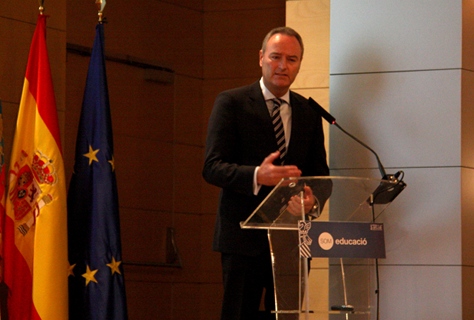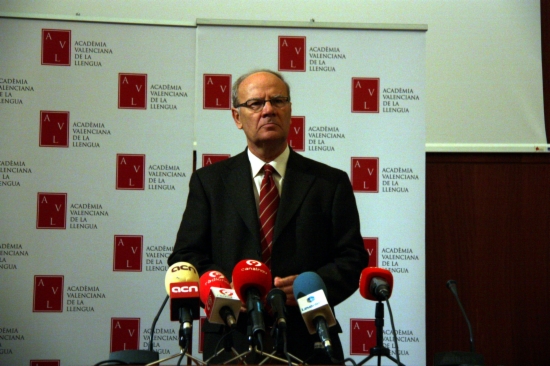04.02.2014 - 10:36
The Valencian Academy of Language (Acadèmia Valenciana de la Llengua, AVL), has postponed the introduction of the ‘Official Valencian Dictionary’ (Diccionari normatiu valencià), that was supposed to be held today, because ‘we have to adjust the web page’s software and because of technical difficulties with the server’.
The AVL has been criticized and threatened by members of the Valencian government and PP members of Parliament for having recognized the unity of the language (i.e., that Catalan and Valencian refer to the same language), and for having allowed other terms that are compatible with the official terminology ‘llengua valenciana’ [Valencian language]. The Academy has postponed the presentation indefinitely.
There are minor differences between the Valencian, Central (e.g., Barcelona), and other dialects of the Catalan language, including vocabulary and verb conjugations—something on the order of the relationship between American and British English. The question of whether Valencian and other dialects of Catalan are the same language has been used politically to divide speakers of the language.
Yesterday, the president of the Valencian government, Alberto Fabra, continued with the threatening tone toward the AVL that had been used by the PP’s Secretary General in Valencia, Serafín Castellano. Fabra says that the institute is not fulfilling its responsibilities as laid out in the Statute of Autonomy and that he will make sure that they do so.
Concretely, Fabra said that Article 6 of the Valencian Statute of Autonomy says that the language of the Valencian people is Valencian. ‘Those of who represent the people in whatever capacity are responsible for defending our identity symbols and our language, and my commitment is to follow the Statute.’
The Madrid daily El País explained yesterday that when asked if he would would respect to the letter what the Statute stipulates about the AVL—as the entity responsible for the language’s official grammar and vocabulary—Fabra answered, ‘I’m not going to go around and around on this. The Statute says our language is ‘Valencian’ and we will defend that above all else.’
Serafín Castellano said yesterday that with this definition of Valencian, the Valencian Academy of Language had no reason to continue existing and that it conflicted with the ‘feelings of the majority of the Valencian population’.
In a communiqué, he insisted, ‘By calling Valencian and Catalan equivalent, the existence of the AVL stops making sense, since it was created precisely in order to defend the personality of our language.’
Castellano, speaking for the PP, underlined, ‘The defense of our language cannot be waived and we will allow no intrusions or attacks on our signs of identity, to that which defines us as a people, to our history, and to our particular way of being.’
Another important figure in the Valencian People’s Party, the vice-ombudsman to the Parliament, Rafael Maluenda, was quick to say that the new dictionary ‘is a travesty and an insult to Valencians’. As the oldest member of the Parliament and member of the leadership board of the People’s Party, he said that the Ombudsman’s office would propose that the party offer ‘an initiative to retract the dictionary’.
Historic Day
On Friday, the Valencian Academy of Language (Acadèmia Valenciana de la Llengua, AVL) made a historic announcement: they approved by a wide majority the ‘Official Valencian Dictionary’ (Diccionari normatiu valencià, DNV). Among the 93,349 entries, the DNV also ‘addresses, without compunctions, the linguistic reality in order to overcome onomastic conflicts’. In other words, the AVL accepts ‘llengua valenciana’ [Valencian language] as ‘the most traditional way’ of referring to the language, although the term is ‘compatible’ [equivalent] with other terms, including català [Catalan].
This can be shown by looking at the definition that was approved for the word ‘valencià’ [Valencian]: ‘Romance language spoken in the Valencian Community, Catalonia, Balearic Islands, and other territories of the Crown of Aragon and that is also called Catalan’. In a release, the AVL added that ‘the recognition of the unity of the language does not imply the subordination of any of the local variants to any of the others’.
Twelve years of work
The DNV is the result of a collective task over twelve years, carried out with linguistic rigor ‘that attempts to carefully balance the different linguistic sensibilities in the heart of the AVL,’ said the institution, which, with the approval, considers Friday a historic day for the language and culture of the Valencian people: ‘January 31, 2014 will mark a turning point for all those citizens who love this most emotional and powerful identity marker that a people can have’.
Since the AVL began its work in 2001, it has published several important tomes, including the ‘Diccionari Ortogràfic i de Pronunciació del Valencià, DOPV’ [Spelling and Pronunciation Dictionary for Valencian] in 2005 with the support of 18 of its 19 members and the ‘Gramàtica Normativa Bàsica] (Official Basic Grammar), unaninmously approved in 2006.
Complaints from the opposition
The opposition parties denounced the PP’s desire to dissolve the AVL.
Various PP leaders made declarations over the weekend critizing the AVL’s position. The PSPV-PSOE, Compromís and Esquerra Unida del País Valencià expressed frustration over these declarations, which according to them, try to fan the flames of linguistic conflict while undermining the language and its scientific study.




